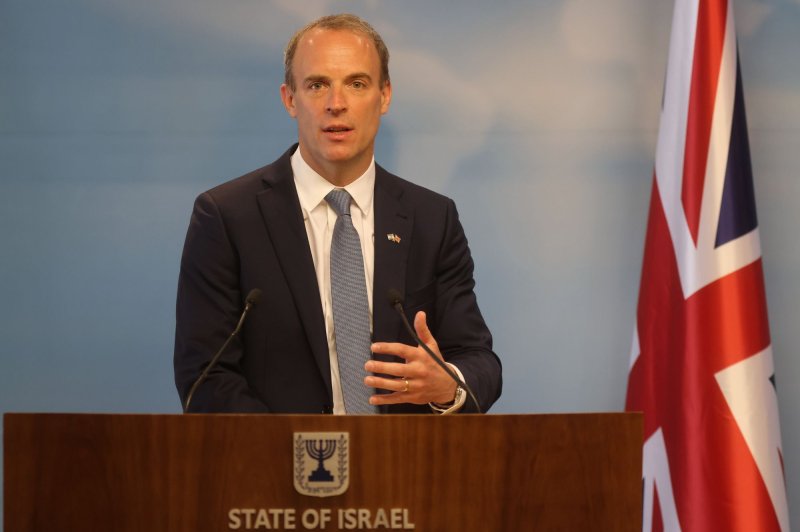Deputy Prime Minister Dominic Raab resigned Friday following the publication of a damning report into his behavior toward civil servants working for him as Justice Secretary and when he was Foreign Secretary before that. File Photo by Menahem Kahana/UPI |
License Photo
April 21 (UPI) -- British Deputy Prime Minister Dominic Raab quit Friday after the publication of a report into allegations he bullied civil servants working for him when he held three of the government's top portfolios.
Raab shared his resignation letter to Prime Minister Rishi Sunak in a Twitter post, saying he was following through on a pledge to step down if the probe found him guilty of bullying but warned that the inquiry set a dangerous precedent that would have "a chilling effect" on those trying to get things done within the government.
"I called for the inquiry and undertook to resign if it made any finding of bullying whatsoever. I believe it is important to keep my word," wrote Raab, who is also the Justice Secretary.
Adam Tolley KC's five-month investigation upheld some of the complaints made by at least 24 civil servants saying he acted in an "intimidating" and "insulting" way. It found he abused his power while foreign secretary from 2019-2021 in a way that humiliated staff and belittled Justice Department staff by describing their work as "utterly useless."
While Raab apologized for "unintended stress or offense that any officials felt," he said the officials' issue was that they could not handle the "pace, standards and challenge" that he brought to the Ministry of Justice.
"That is, however, what the public expect of Ministers working on their behalf."
Raab pointed to the fact that Tolley dismissed all but two of the allegations leveled against him and said that its two adverse findings were flawed and "set a dangerous precedent for the conduct of good government."
He warned that the democratic principle of ministerial responsibility would be lost if ministers' authority over senior officials involved in critical negotiations being conducted on behalf of the British people was diluted.
"This was particularly true during my time as foreign secretary, in the context of the Brexit negotiations over Gibraltar, when a senior diplomat breached the mandate agreed by Cabinet," wrote Raab.
He added that it was vital that ministers must be able to give direct critical feedback on senior officials "in order to set the standards and drive the reform the public expect of us."
Raab said that while his criticism needed to be contained with reasonable bounds, Tolley found that he had never sworn, shouted, thrown anything or otherwise physically intimidated anyone, nor intentionally sought to belittle anyone.
In setting the threshold for bullying so low, Raab wrote, the inquiry had set a dangerous precedent that would encourage spurious complaints against ministers and have a chilling effect on those driving change.
Sunak said he accepted the resignation of his "friend and political ally" with "great sadness" in a reply, adding he believed it was clear there had been shortcomings in the process that had negatively affected all involved.
"Your resignation should not make us forget your record of delivery in both this government and previous administrations. These achievements should make you extremely proud," Sunak wrote.
The opposition Labor leader Keir Starmer attacked what he said was the prime minister's ongoing weakness.
"There's a double weakness here. He should never have appointed him in the first place, along with other members of the cabinet that shouldn't have been appointed, and then he didn't sack him," he said. "Even today, it's Raab who resigned rather than the prime minister who acts."















